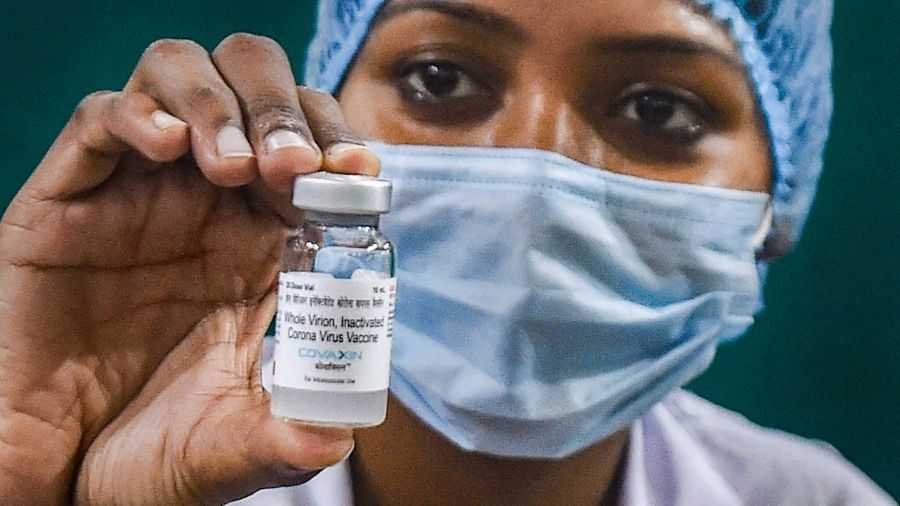Bharat Biotech’s Covaxin vaccine “is highly efficacious” in preventing symptomatic Covid-19, according to long-awaited results from a study published in the peer-reviewed UK medical journal The Lancet.
The Indian regulatory approval for the rollout of Covaxin in January had sparked widespread controversy in the scientific and medical world as it was given at a time when the Phase-3 trials of the vaccine were still underway.
Covaxin, whose scientific name is BBV152, offers “77.8 per cent protection against symptomatic Covid-19 in adults,” according to the interim Phase 3 study whose results were reported Wednesday.
Bharat Biotech which funded the Phase 3 study along with the Indian Council of Medical Research said the findings should “remove any doubts about the vaccine’s efficacy and safety. The company added it was committed to “data transparency” in a shot at scientists and doctors who had criticized the company for putting the vaccine on the market without “adequate efficacy data.”
The findings reported in The Lancet, which are in line with previous efficacy results, come a week after the World Health Organization gave the all-clear to the indigenously made vaccine for emergency global use, 11 months after it was first approved in India.
The study noted “several limitations” in the representative nature of the trial group due to the lack of inclusion of pregnant women -- pregnant women are almost invariably excluded from clinical trials. But the article’s overall conclusions about the vaccine were positive and it said the study had “several strengths,” including its wide age range of 18 to 98 years. The study reported “no major differences in immune responses across the broad age groups.”
The vaccine is “highly efficacious against laboratory-confirmed symptomatic COVID-19 disease in adults. Vaccination was well tolerated with no safety concerns raised in this interim analysis,” the study said.
In a separate Lancet article, Chinese Covid-19 experts Jing-Xin Li and Feng-Cai Zhu of the Jiangsu Provincial Center for Disease Control and Prevention Phase 3, called the study’s findings a “welcome advance,” particularly its preliminary conclusions that the vaccine was effective against the highly contagious delta variant.
The Indian regulatory approval for the rollout of Covaxin in January sparked widespread controversy in the scientific and medical world as it was given at a time when the Phase-3 trials of the vaccine were still underway.
The study was carried out between November 2020 and May 2021 and involved 24,419 volunteers at sites across India. The participants were aged between eight and 97. No severe-vaccine-related deaths or adverse events were reported.
The vaccine, which uses an older “inactivated-virus” technology that has been used for decades in vaccines against polio, influenza and rabies, “was well tolerated,” the study noted.
The protection offered by Covaxin compares favourably with the Serum Institute of India’s Covishield vaccine developed by Oxford University, The Phase-3 study said.
While overall efficacy against any symptoms of COVID-19 was 77·8 per cent, efficacy against severe COVID-19 was 93·4 per cent, according to the study.
Preliminary analysis found an efficacy of 65·2 per cent against the highly contagious delta variant.
Chinese experts Li and Zhu said that particularly important was the study’s preliminary analysis findings of an efficacy rate of 65·2 per cent against the “extraordinarily transmissible” delta variant.
“In all the delta-positive cases, the viral load in vaccine recipients was significantly lower than in the placebo recipients,” they noted.
Zhu and Li said the ramping up the rollout of Covaxin could help increase vaccine supplies to low- and middle-income countries, given that it can be much more easily stored than mRNA vaccines that must be kept at sub-zero temperatures. Covaxin can be shipped and stored for up to 12 months in any refrigerator at 2-8 degrees centigrade.
The vaccine could lessen “the ultra-cold chain requirements of other vaccine platforms, increase the finite global manufacturing capacity, and improve the insufficient supply of vaccines,” Zhu and Li said.
The WHO has called Covaxin “extremely suitable for low- and middle-income countries due to its easy storage requirements.”
Results of clinical trials on the use of Covaxin in children aged from two-18 years now are being evaluated by the Indian drug regulator.










